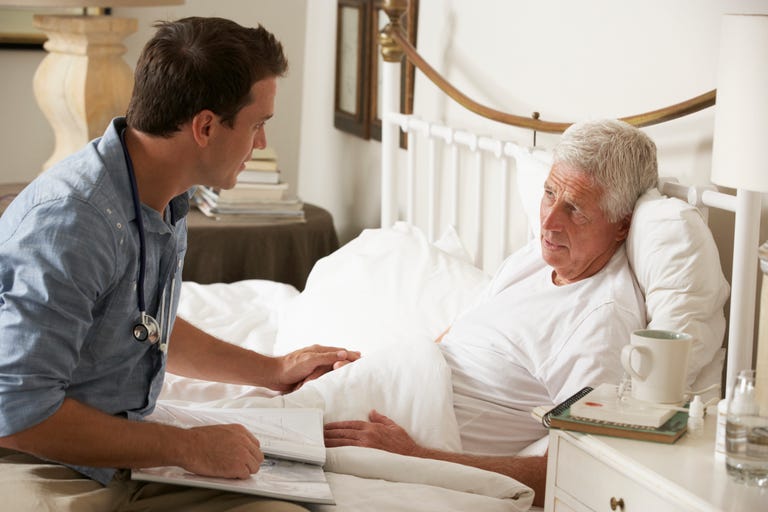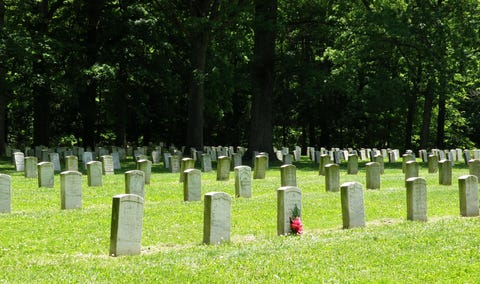Death Is Inevitable. His Job Is to Help You Go in Peace.

Henry Fersko-Weiss wants to help you die. He’d like to spiritually and emotionally guide you through the process, if you’ll let him. You would be one of hundreds of people he’s aided as they gave the bucket a final, resounding kick.
Fersko-Weiss is a death doula. Death doulas are volunteers and professionals who assist and support patients as they naturally pass on. Whether you’ve received a fatal diagnosis or are a withering baby boomer, you can hire these doulas to guide you through the dying process. They’ll help you make amends, say goodbye to your family, and create a death plan. Whether you want to blast the Grateful Dead as you go or be buried at sea, doulas are the people who help make it happen.
Fersko-Weiss isn’t just a death doula—he’s the death doula. He created the first end of life doula program in the U.S. after working in hospice care for years, and then founded the International End of Life Doula Association, which trains and certifies doulas.
“There’s this refusal to accept the idea that life is limited and we will all have to die,” says Fersko-Weiss. But no matter how much we fear it, hiding behind our evolutionarily programmed instinct to fight it off, we are all organically “built to die,” he says.
So we asked the death doula for his best advice on dealing with our inevitable demise. Because we all have to go sometime, and it might as well be with a little grace.

Getty ImagesJim Hammer / EyeEm
Is it harder for men than women to accept death?
The simple answer is yes. Men—particularly of an older generation brought up in the era of Mad Men-style machismo—have a different set of core values than women, Fersko-Weiss says.
“Men have this need to feel productive,” Fersko-Weiss says. “If they’re not productive then they have no meaning. They lose a sense of purpose in their lives. And so when men are approaching their deaths—because they are having to let go of their ability to participate in work or in the social life or in the role as a father, a husband, a family member, a member of the community—they feel like there’s no purpose left in the time they have. And so for them, it’s more about just waiting to die.”
Meanwhile, he says women in general have an easier time, “because relationships are still such a core value in their life, and they are so connected to their emotions.” This makes them more likely to value the time they have left.
How can you overcome the feeling of impending doom?
Fersko-Weiss says the best way to tap into emotions about your death is to think about your life. Your legacy. What you’ve done right and what you’ve done wrong. What you’ve accomplished. Did you climb Mount Everest? Great. Raise a beautiful family? Wonderful. Troll a record number of celebrities on the Internet? To each their own, dude.
“As we move into that, perhaps the door opens to talk about emotions related to those pieces of life that either worked well or didn’t work so well,” he says. “We all have places that didn’t work well in our lives, where we have missed the mark or fallen down in some way. There’s a real need to look at those pieces… to release some of the energy that’s captured in them.”
Whether we’re acknowledging our successes or learning from our mistakes, being introspective can give us back that sense of purpose Fersko-Weiss was talking about before. Passing the lessons of that legacy on to future generations makes us feel like we’re leaving something meaningful behind—even if that something is just advice.
What’s the best wisdom dying men have passed on?
Dying men emphasize that it is important to lean into the things you’re passionate about, says Fersko-Weiss. Whether that’s woodworking, accounting, or collecting Bernie Sanders memorabilia, just do it. And do it with heart.
“When men are approaching their deaths they feel like there’s no purpose left in the time they have. It’s more about just waiting to die.”
“Some of the lessons that people have talked about have revolved around following your passion,” he says. “It shouldn’t be just about earning a living and taking care of our families. It needs to have more depth than that. Even men whose jobs wouldn’t be ones we could consider jobs of passion, [those jobs] can still be jobs that they’ve put their life energy into. That has more meaning to them than just earning a paycheck.”
Another lesson that rings a little truer when it comes from the mouth of a dying person: Don’t sweat screw-ups as much as you’re inner voice of crippling anxiety is telling you to.
“Don’t worry about making mistakes. We all make mistakes, and sometimes we get caught up in beating ourselves up about the mistakes we have made,” says Fersko-Weiss. “But try to find within those mistakes or those failures…a way to utilize that to turn it into something that will help us to live better, live deeper, live more meaningfully.”
Is it okay to joke about death and doom, like we so often do on social media?
“Oh, absolutely,” Fersko-Weiss says. “I think anything that pierces that bubble of resistance around the idea of death is helpful. Humor is one of the ways I think we always deal with our fears.”
So make all the death jokes you want. Just avoid making them at the actual funeral.
What do people regret the most?
A regret is a regret, and it can be emotionally taxing. But Fersko-Weiss says people generally most regret harsh words or mean-spirited comments they said in the heat of the moment. But they spill out—especially if you’re the sole caregiver for your loved one as they’re dying.
“If somebody has allowed something harsh or mean or exasperated to come out because of the huge burden it is to take care of somebody…they regret that tremendously,” Fersko-Weiss says.
But not saying what you want to can also weigh on you.
“If there are things they have not said that they felt they should have, that can also haunt people,” he says. “I don’t know if it has the same intensity as the other, but that can also be haunting.”
Is it more important to have a good life or a good death?
Easy answer: A good life.
“We’re not in control of what happens to our bodies with the illnesses that come to us,” Fersko-Weiss says. “But if we’ve had a good life, we may go through our dying process—no matter what it is physically—with a lot more grace.”
From: Esquire US
Source: Read Full Article


